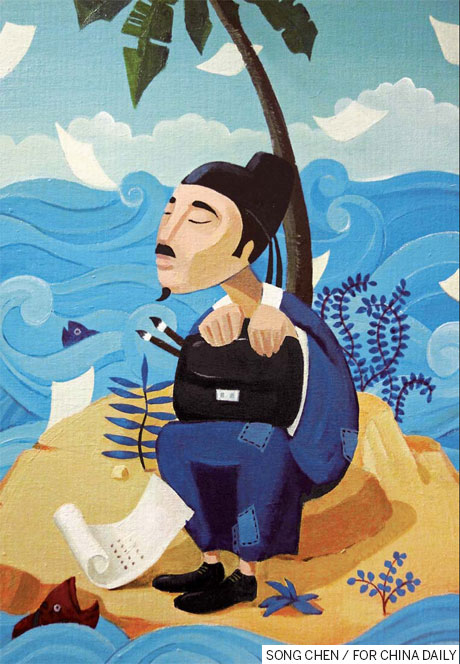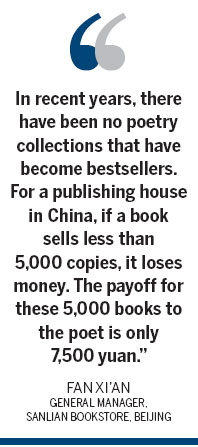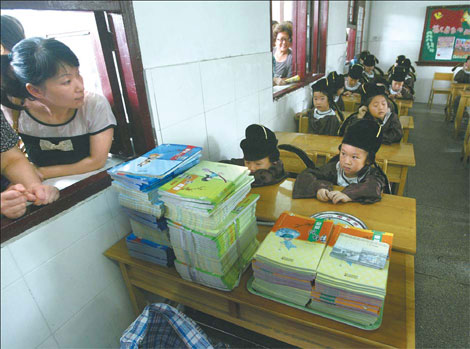Battle of words over the future of poetry
Updated: 2012-02-03 10:46
By Zhang Yuchen (China Daily)
|
|||||||||||

The ability to write verse may be a dying art in modern China but the Internet is providing lines of inspiration for a new generation. Zhang Yuchen reports.
It may mark a turning point for China's traditional publishing houses that they have no plans to publish the works of last year's winner of the Nobel Prize for Literature, Swedish poet Tomas Transtromer, despite having printed the collections of previous laureates. Some might argue that it is an indication the world is becoming more crude, more cynical and less appreciative of issues, such as nature, that the 80-year-old focuses on.
It certainly seems in some quarters that poetry has no hold on many people today. A survey in November showed poets are among the bottom three in a list of relationship partners in a country with about 3,000 years of history of writing poems.
"(Modern) poetry in China is dead," said Wolfgang Kubin, the German Sinologist, in a public lecture on Chinese modern poetry on Nov 24. He then contradicted himself in a carefully phrased way: "It is, however, still living. It lives at the edge of society unnoticed by the majority. Its readers are the few people who really appreciate good literature."
The young, it seems, are not among the latter faction. As older poets produce and are published less, and some have stopped altogether, some observers say no one is stepping into their shoes.
"I have yet to pay much attention to poets under 30, if that is the younger generation," Kubin said. Usually Chinese writers and scholars introduce works of literature to him and recommend they be translated. "It seems to me that I have not yet heard a voice that tried to convince me of the high quality of poets under 30," was his withering assessment.
The decline in China's poetry is marked elsewhere. "Poetry reading groups have got smaller as good poetry diminishes and the competition falls," said Xie Mian, deputy director of the New-style Poetry Research Institute of Peking University. "That is something new."
Many believe that the irrelevance, in today's world, of traditional motifs and a greater focus on the trivialities of daily life, plus the way language is changing, add to the poor outlook for the less prosaic forms of literature.
Most modern Chinese poets attracting attention are those who emerged in the 1980s, then aged in their 20s, such as Zhai Yongming, Zhang Zao (1962-2010) and Hai Zi (1964-1989). Their works are embedded with beautiful images, an enlightening spirit and perceptive thoughts relevant to the time that captured the imagination of the world when they were younger.

"In the 1980s, college students - even those majoring in mathematics - wrote and read poetry. However, few graduates and undergraduates studying Chinese literature are into poetry," said Ren Youqun, vice-president of East China Normal University.
Four college poet societies established in the 1980s became famous - the May 4 Literature Society at Peking University in Beijing, Fudan Poets Society at Fudan University in Shanghai, Innocence Poets Society at Jilin University in Northeast China, and Jiangnan Poet Society in Anhui province in East China.
In the 1980s the gathering of a poetry society would attract crowds of college students in and outside the biggest conference hall on campus, said Xiao Shui, a former president of Fudan Poets Society.
If anyone wanted to join Fudan Poets Society they had to sit a test for membership, according to Xiao. They had to write a poem on the spot after being given a set topic. Every year only 10 to 15 college students were admitted as official members. "Now students just need to fill in a form with their name and contact details to gain admission to the circle," he said. "But they rarely write anything or take part in activities."
Bei Dao, the pioneer of a new genre of Chinese poetry in the early 1980s, believes that college students and scholars who used to read poetry have lost their enthusiasm for it amid China's social transformation; now poetry only evokes nostalgia for them.
Since the early 1990s, poets who had previously expressed no interest in making money found themselves caught up in China's "gold rush". They headed south in their droves to pursue a much better life of materialism.
Bai Ya, from Anhui, was one of those who stopped writing poetry in the 1990s and joined the exodus to Guangdong, the most economically active province in China at that time, to work.
He spent seven years working in public relations without writing another poem. Even top poets gave it up for a couple of years.
"As far as I know, anyone in the 1990s who carried on writing or reading poetry were teachers," said Bai.
"In such a populous country, it would only take a niche audience to re-ignite the development of poetry, so it's a pity that such reader groups have not yet formed," he was quoted by Xinhua News Agency as saying.
Publishing houses have now lost interest in poetry, said Fan Xi'an, general manager of Sanlian Bookstore in Beijing, "In recent years, there have been no poetry collections that have become bestsellers. For a publishing house in China, if a book sells less than 5,000 copies, it loses money. The payoff for these 5,000 books to the poet is only 7,500 yuan. ($1,190)"
However, with the new millennium came a growth in social reflection propelled by the relatively new medium of the Internet.
"We always suffer under the illusion that young people read and write less poetry but it is not true," said Wang Xiuyun, editor of Beijing Literature. "Many young people from different backgrounds write good poetry. We just don't know them because there is less communication between the two generations."
Many young poets believe it is the best time for China's modern poetry. "Thanks to the Internet, now students can write their poetry online and paste the verses on different platforms: BBS (bulletin board systems), forums or pure literature websites," said Yu Huaiyu, the founder of Poetry Paper website, one of the three largest poetry websites, which handles more than 1,000 discussion threads every day online.
Hundreds of thousands of literature-relevant websites have transformed the landscape and given new blood to the medium, say devotees.
Poetry Paper has more than 10,000 active members from home and abroad.
"It is an era of thriving online poetry for ordinary people," said Yu, speaking about the website he established 10 years ago. "Poets freely share with each other online."
The people writing on the website are divided equally among those born in the 1960s and 1970s, those born in the 1980s and those born in the 1990s.
Modern poetry pioneer Bei Dao said in an interview with Xinhua that the young generation of readers who grew up in the era of commercialization could not escape the impact of the times.
Nowadays young poets or young people trying to write poetry focus on the pragmatic issues of daily life, among them the great pressures from living an urban life, the high cost of buying a home, and romantic issues.
"Before, poets cared more about social responsibility. Of course, it should have been their concern, but we can see more how much they cared now young people center on their own lives and spirit," said Xu Demin, who founded Fudan Poets Society in 1981.
"Poetry is more like a pipe transmitting various emotions in today's society," said Wang Chenlong, 24, former president of the student poets society at Minzu University of China, Beijing. "In many society members' minds our society has already been playing a role like other kinds of societies, such as animation groups or skateboard clubs. In their eyes, there is no difference."
During the worst period of Wang's presidency, only five undergraduates, including one from the law school, were members of the society. At the time, about 100 undergraduates and postgraduates were majoring in Chinese literature on campus.
"It is OK by me," said the poetry fan, who is preparing for the entrance examination for this year's Chinese modern literature postgraduate study. "Reading and writing poetry, as always, interests only a few."
Every six months, Wang seeks to collect poetry from his friends or fellow students to publish and share.
Although Wang said most of his friends stopped reading and writing poetry as soon as they left university, he and other young poets believe now is the best time for real poet writing from the heart.
"With huge change and new social problems arising, I think young poets can draw on more material for their work," he said.
Many believe that because the poets have no market, they cannot sell themselves. The corollary to this is that if they go on writing poetry, they can devote themselves to true literature. In this respect a young poet can master the demands that any future potentially excellent work puts upon him or her.
"(Good modern Chinese poetry) might exist," said Wolfgang Kubin. "I would be glad if someone would one day say to me, 'See, this young man or woman writes great poetry'."
There are many who hope he is right.
Mei Jia contributed to this report. Contact the reporter at zhangyuchen@chinadaily.com.cn
|
Newly enrolled first-graders at a Nanjing primary school start their first class at the city's Confucius Temple. Children are encouraged to learn more about traditional Chinese culture, which may help produce more poets in the future. [Duo Duo / For China Daily] |
Today's Top News
Rescuers race against time for quake victims
Telecom workers restore links
Coal mine blast kills 18 in Jilin
Intl scholarship puts China on the map
More bird flu patients discharged
Gold loses sheen, but still a safe bet
US 'turns blind eye to human rights'
Telecom workers restore links
Hot Topics
Lunar probe , China growth forecasts, Emission rules get tougher, China seen through 'colored lens', International board,
Editor's Picks

|

|

|

|

|

|






